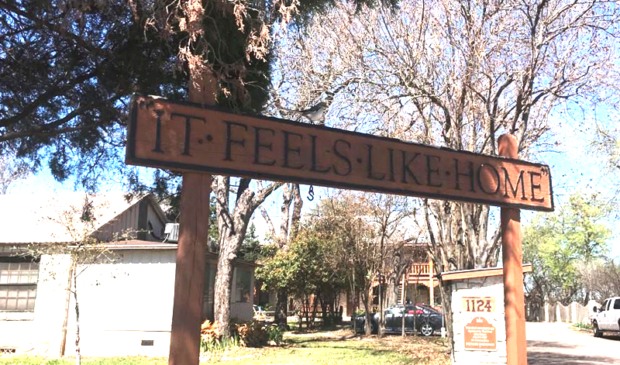Planning Commission recommends rezoning amid ‘heartwrenching’ testimony
Friday, May 13, 2022 by
Jonathan Lee A case at the Planning Commission Tuesday highlighted the vulnerability of renters amid Austin’s rapid growth, as older apartment buildings are increasingly torn down to make way for new development.
At issue is the Old Homestead apartment complex, an 80-year-old, 16-unit building at 1120 and 1124 Clayton Lane. Developer JCI Residential seeks a zoning change from Community Commercial-Mixed-Use (GR-MU-CO-NP) to Vertical Mixed-Use (GR-MU-V-NP) in order to build 295 units on the 2-acre site.
The VMU designation means 10 percent of the units will be affordable for those making 80 percent of the median family income (or 60 percent MFI if Council adopts proposed changes to VMU). If the zoning change fails, land use consultant Alice Glasco said a different developer would happily build up to 106 “very expensive condos” – none of which would be income-restricted – under current zoning.
When the case came before the commission a month ago, testimony from resident Andrew McKenna prompted a postponement to ensure tenants facing displacement get fair treatment. McKenna said he wasn’t notified of the rezoning and feared becoming homeless if he had to move.
At Tuesday’s meeting, Glasco described the tenant outreach conducted over the past month. Glasco held two meetings with tenants and offered to help relocate them to one of three other JCI properties, where some units are priced for those making between 60 and 100 percent of the MFI. JCI will also waive the first month’s rent at these properties. The developer’s efforts go above and beyond what is required by law.
But some Old Homestead residents may still have trouble affording those units. Loretta Tubbs is looking for apartments priced for those making 30 percent MFI. She worries she won’t be able to find an affordable place to live, especially one that’s nearby, where she is close to friends and family. “There are very few apartments, and the waitlists are long,” she said.
Tubbs said she will also miss the building’s homey charm and the large shade trees surrounding it. “I will have to find a big-box generic building to live in, but it will never feel like home,” she said.
Glasco said two tenants, Tubbs included, have reached out for help finding new homes. Residents have to leave their current homes by Dec. 31. Austin’s Tenant Relocation Ordinance, which helps pay for moving costs for low-income tenants facing displacement, may also be of some assistance.
Commissioners questioned Glasco and JCI President Kurt Goll about their engagement with tenants and what protections will be offered. Some also tried to make sure the developer finds Tubbs a home, but Goll said it was not the commission’s role to mediate discussions between Tubbs and the developer. “When you go to rent an apartment, you can ask for what you want,” Goll said. “We can have that discussion. But I think in a public place, we can’t offer it for one person.”
Chair Todd Shaw reined in the discussion. “This is heart-wrenching, but we have certain purview,” he said, adding: “We really can’t solve all the city’s problems. We need to really stay in our lane, focus on the zoning case.”
The commission recommended approval of the rezoning on a 10-3 vote, with commissioners Carmen Llanes Pulido, Solveij Rosa Praxis and Awais Azhar voting against.
“I cannot in good conscience approve a project that’s going to eliminate naturally occurring affordable housing,” Llanes Pulido said. Azhar said he wanted the developer to help tenants even more by covering moving costs, waiving more than one month’s free rent and offering a right to return to the new project. He also wanted to pin down the developer’s promises through legally enforceable documents.
Shaw suggested members bring forth amendments to the city code to strengthen tenant protections. “We can do things. We can make change here, we have that authority. So bring on the suggestions and let’s try to do some good.”
The Austin Monitor’s work is made possible by donations from the community. Though our reporting covers donors from time to time, we are careful to keep business and editorial efforts separate while maintaining transparency. A complete list of donors is available here, and our code of ethics is explained here.
You're a community leader
And we’re honored you look to us for serious, in-depth news. You know a strong community needs local and dedicated watchdog reporting. We’re here for you and that won’t change. Now will you take the powerful next step and support our nonprofit news organization?



